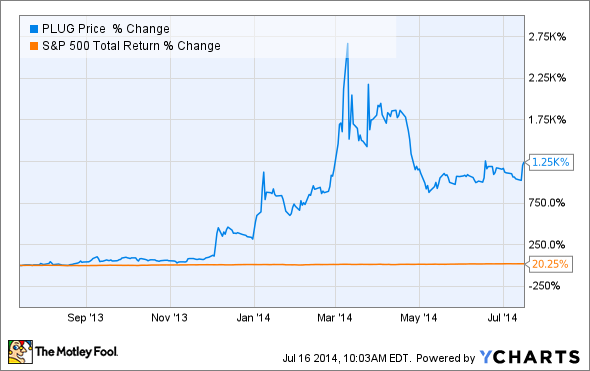Plug Power (PLUG +4.42%) investors have had a very good year:
Shares are up over 13-fold on the news of major new orders from Wal-Mart for 1,700 fork lift fuel cells and six-year service contracts. This helped to raise Plug Power's backlog from 1,400 units to 3,700 units. Recently FBR analyst Aditya Satchare issued an $8 price target, based on projected 10% fork-lift market share and $200 million in annual revenues by 2017.
Those sales projections represent a 700% sales increase in just four years and have some analysts predicting Plug Power can achieve profitability in 2015.
Mrs. Satchare's price target reveals her view that Plug Power is 41.5% undervalued -- at least based on these growth expectations.
However, the key to such an analysis is whether those growth expectations are reasonable. As I'm about to explain there are very good reasons to believe not.
The problem with Plug Power
Fellow Fool contributor Lennox Yieke recently wrote an eloquent bull case for Plug Power. His argument was that Plug Power is doubling its sales force in an effort to strongly grow sales and that its recent acquisition of ReliOn would make it independent of competitor Ballard Power Systems (BLDP +3.33%) from whom it sourced its fuel cells, resulting in long-term cost savings.
However, there are three reasons I must respectfully disagree with these arguments and recommend against investing in shares of Plug Power: accelerating dilution, accelerating costs, and a small potential market.
First, though its order count is growing, Plug Power has a worsening history of diluting shareholders faster when sales are growing. For example from 2009 through 2011 Plug Power increased sales 133% from $12 million to $28 million. The share count rose by 46% over this time.
Since 2011, the share count has increased 1,050% while sales for this year are projected to increase 164% since that time.
Plug Power's fundamental problem is that to achieve its immense growth potential it will need cash, a lot of it. The ReliOn acquisition may prove to have long-term cost savings, however Plug Power purchased it for just $4 million. This indicates that ReliOn was a small time producer of fuel cells and if Plug hopes to source its fuel cells away from Ballard Power Systems, it will need to invest large amounts of capital into ReliOn. Thus, at least in the next few years, Plug Power's margins are likely to drop, not improve, as it massively grows its business.
This could result in Plug being an excellent growth story, but a terrible long-term investment. Consider that since 2010 Plug Power's market cap has increased 750%, yet its share price is down 37.5%. That's a result of dilution, and Plug Power's track record is to print massive amounts of shares to raise capital, often at 50+% discounts to market value.
Another problem with the long-term bullish argument for Plug Power is the size of its potential market. The recent analyst upgrade estimated the forklift market at $2 billion/year but I've seen estimates of the equipment handling market as high as $4 billion.
In order to justify the kind of long-term growth estimates I quoted above, investors in Plug Power have to assume three things:
- Plug Power's potential market will grow substantially.
- It will grow its market share.
- It will stop raising capital by selling shares.
It is a chicken and egg problem. Plug Power can't stop diluting shareholders until it can become profitable but it can't become profitable without raising more money, all at the expense of existing shareholders.
Foolish bottom line
Plug Power's track record thus far seems to be that the faster it grows the faster it issues shares. This will make long-term earnings growth high enough to justify the existing share price difficult if not impossible. Therefore I recommend against investing in Plug Power, at least until the valuation comes down and the company can prove its ability to grow without obscene amounts of shareholder dilution.









